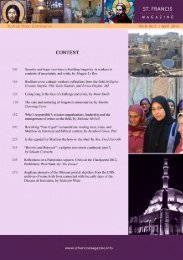download the pdf - St.Francis Magazine
download the pdf - St.Francis Magazine
download the pdf - St.Francis Magazine
You also want an ePaper? Increase the reach of your titles
YUMPU automatically turns print PDFs into web optimized ePapers that Google loves.
<strong>St</strong> <strong>Francis</strong> <strong>Magazine</strong> Vol 8, No 4 | August 2012<br />
has been read as indicating “adaptability even to a pagan culture like<br />
Corinth as long as one is guided by conscience and by <strong>the</strong> desire to<br />
glorify God and see people be saved,” (Woodberry 2007: 25) and 1<br />
Corinthians 11:1 has been read as supporting an embrace of Muslims<br />
and Islam (Woodberry 2007: 24, also appealing to Acts 16:3;<br />
21:26). Such claims need to engage with <strong>the</strong> wider context of 1 Corinthians<br />
8-10 and its assertions of an anti-idolatry reading which<br />
Wi<strong>the</strong>rington (1998: 466) succinctly summarises as being concerned<br />
with “venue ra<strong>the</strong>r than menu.” Such a reading would problematise<br />
claims for C5 in a manner not yet recognised within <strong>the</strong> debate. It<br />
will also provide important contextual considerations for performative<br />
utterances such as <strong>the</strong> shahada. 23<br />
The same need for more integrated appeals to scripture is also<br />
evident in relation to <strong>the</strong> use of Acts in defending C5. For example,<br />
too many appeals to Acts 15:19 have not taken v.20 into account,<br />
with its four elements which qualify <strong>the</strong> preceding verse. Remarkably,<br />
among <strong>the</strong> literature reviewed here, Tennent (2006: 105-107)<br />
was <strong>the</strong> first, and a rare, exception in considering both <strong>the</strong>se verses.<br />
Fur<strong>the</strong>r, he did seek to address <strong>the</strong> practical difficulties of parsing<br />
‘culture’ from ‘religion’ within actual lived experience via his hypo<strong>the</strong>tical<br />
musing about a ‘Cairo Council’ mirroring his reading of<br />
Acts 15 (Tennent 2006: 107). Yet Tennent’s exegesis remained<br />
narrow and detached from <strong>the</strong> wider context of Acts 15. Corniche<br />
(2010a) has provided <strong>the</strong> most detailed and persuasive exegesis of<br />
Acts 15 within <strong>the</strong> literature reviewed here, but he is no advocate<br />
23 Waterman (2007: 58-59) called for attention to <strong>the</strong> <strong>the</strong>ologically ‘untrue’<br />
dimensions of such confessions, especially when made regularly ra<strong>the</strong>r than in<br />
extremis as a last resort. He questioned whe<strong>the</strong>r <strong>the</strong> shahada confession can be made<br />
simply as a cultural marker, akin to an unbeliever in England participating in a<br />
toast declaring ‘God save <strong>the</strong> Queen.’ (Brown, in Corwin et al. 2007: 15) Waterman<br />
demurred on two grounds: first, that it risks taking God’s name in vain (Exodus<br />
20:7) and, second, that early believers did not follow such an approach to <strong>the</strong><br />
confession ‘Caesar is Lord.’ Waterman judged this latter confession to be more<br />
analogous to <strong>the</strong> shadada than ‘God save <strong>the</strong> Queen.’ Brown (2007b: 71-73) has<br />
responded to Waterman and Corwin: while not always convincing, his response<br />
does demonstrate <strong>the</strong> spatial and performative complexities of <strong>the</strong> question.<br />
<strong>St</strong> <strong>Francis</strong> <strong>Magazine</strong> is a publication of Interserve and Arab Vision 471







![Reflections on Surah Fatiha and the Lord's Prayer[1] - St.Francis ...](https://img.yumpu.com/49377951/1/184x260/reflections-on-surah-fatiha-and-the-lords-prayer1-stfrancis-.jpg?quality=85)









